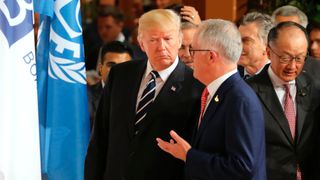In 1963, President John F. Kennedy believed that 25 countries would have nuclear weapons by the 1970s. Today, only nine do. Many credit the Treaty on the Non-Proliferation of Nuclear Weapons (NPT), which opened for signature 50 years ago this July. The treaty, which entered into force with 43 signatories in 1970, has now been signed by 191 countries, including the United States and Australia.
The NPT enshrines three central principles aimed at eliminating the threat of nuclear weapons worldwide: states with nuclear arms should disarm; the future development of nuclear weapons should be prevented; and the peaceful use of nuclear technology should be allowed and monitored by the International Atomic Energy Agency (IAEA). There is little doubt that the NPT was crucial to preventing the massive wave of proliferation that seemed imminent in the 1960s. The future of the agreement, however, is unclear.
The strengths that have allowed the NPT to reach the 50-year mark provide hope for the future of the agreement. One such strength is transparency concerning the nuclear capabilities of member countries, which is facilitated by the IAEA through regular inspections. These inspections also allow states to use nuclear technology for peaceful means, particularly to generate energy, without being perceived as a security threat by other nations, which also sweetens the deal for signatories.
The NPT has successfully helped further a taboo surrounding the use of nuclear weapons in conflict and an international norm of non-proliferation. This norm is currently being put to the test by a series of countries who have proliferated outside of the NPT.
Perhaps the greatest strength of the agreement is not formally outlined in the Treaty. The NPT has successfully helped further a taboo surrounding the use of nuclear weapons in conflict and an international norm of non-proliferation. This norm is currently being put to the test by a series of countries who have proliferated outside of the NPT.
With Trump abandoning the Iran deal – which limited Iran’s ability to develop nuclear weapons in exchange for reduced sanctions – European leaders are becoming more outspoken on issues of non-proliferation. As France, Germany, and the United Kingdom attempt to save the deal, there is potential for Australia to take on a larger role in the future of non-proliferation. Australian leaders will have to decide whether to prioritise their normative commitments to diplomacy and international cooperation alongside the European Union by taking steps to salvage the Iran deal, or to put their security interests first and conform to US policy in Iran, even if they disagree with it.
Australia has already stood in solidarity with the European Union by condemning America’s exit from the Iran deal. Prime Minister Malcolm Turnbull expressed his “regret” following the US decision and stated, “We encourage all parties to continue to comply with the deal, and we certainly are trying to support that.” Although his statement falls short of committing Australia to preserving the deal, it reflects public disagreement with the Trump administration, a rare incidence in Australia’s foreign policy. This break indicates Australia’s continued dedication to international cooperation and diplomacy in ensuring nuclear non-proliferation.
After the US exit from the Iran deal, European Council President Donald Tusk stated that “the real geopolitical problem is when you have – not an unpredictable opponent or enemy – the problem is if your closest friend is unpredictable.” While it is unrealistic that Australia will form an alliance with Europe that rivals its relationship with the United States, perhaps it is time for the Australian government to broaden its involvement in the international community by taking a leading role in maintaining norms of non-proliferation.
Without nuclear weapons of its own, Australia ostensibly depends on the strength of America’s nuclear arsenal for its national security. Yet unlike American security alliances with NATO and other allies, the US-Australian security treaty does not explicitly require the United States to use nuclear weapons to defend Australia.
Going too far in opposing US nuclear policy would potentially risk weakening Australia’s strategic relationship with the United States, while bringing into focus another nuclear challenge for Canberra. Without nuclear weapons of its own, Australia ostensibly depends on the strength of America’s nuclear arsenal for its national security. Yet unlike American security alliances with NATO and other allies, the US-Australian security treaty does not explicitly require the United States to use nuclear weapons to defend Australia. As such, it may be more difficult for Australia to diverge too far from American foreign policy when, unlike France and the United Kingdom, it does not have its own nuclear weapons for self-defence. Ultimately, if Australia were to go too far in countering US nuclear policy, its position under the United States’ nuclear umbrella could be revoked.
This debate foreshadows a potentially more severe clash between Australian and American nuclear interests in the future. A number of Australian Labor Party MPs have pledged to go even further than merely supporting non-proliferation by committing to signing a comprehensive ban of nuclear weapons if the Labor party is voted into power. Regardless of the outcome, Australia faces a choice: strengthen the US alliance by creating greater alignment between the US and Australian security regimes or further distinguish Australia’s proliferation policy from that of the United States by joining the coalition of European powers condemning America’s unilateral actions. Given the growing support for the Australian Labor Party in the polls, it may be simply a matter of time before the electorate makes that choice for the government.





